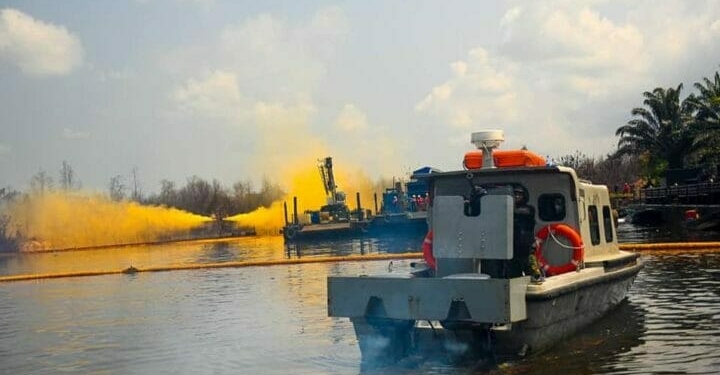Industry experts have asserted that only deliberate interference with the Santa Barbara wellhead equipment could have enabled a disruption to its normal functions.
The wellhead, owned by Aiteo Eastern Exploration and Production Company (AEEPCO), is located in Nembe community, Bayelsa state.
Recall that Aiteo had on November 5, reported a hydrocarbon wellhead leak in its Santa Barbara south-west field.
According to engineers, the spillage, which has now been stopped, could only have resulted in that type of outcome because the device was tampered with.
The experts concluded that it was impossible for a wing valve installed on a wellhead to become detached abruptly. They added that it could only have been achieved if the facility had been altered by unauthorised persons.
The Nigerian Upstream Petroleum Regulatory Commission (NUPRC) and the National Oil Spill Detection and Response Agency (NOSDRA) had also linked the leak to sabotage.
During a joint investigative visit (JIV) to the Santa Barbara River, Nembe, both organisations, based on their on-site assessment of the wellhead, had agreed that unknown persons would have been tampered with with the wing valve, leading to the leak that caused the blowout.
The representative of the NURPC, Mr Adetoyinbo Adeyemi, was quoted as saying, “The wing valve has been replaced now. That means that the wing valve, the way it was, is not designed to fail like that because bolts are surrounding it, well designed to keep the pressure in place.
“So, if it had not been taken off, there is no way it could have moved from there. When it was reported initially, there was no valve in that place, and none was found. So, to us, it is an act of sabotage.”
Ismail Baba-Ahmed of NOSDRA also traced the leak to the same cause.
Baba-Ahmed said that from his expertise in fluid mechanics, his physical examination at the site and his interactions with the wellhead experts who plugged the leak, only vandalism could have led to the blowout.
“The most likely cause that could remove those valves were external influences. If those valves were removed under internal pressure, the thread would wear out because it will pull out,” he said.
On his part, Victor Ekpenyong, chief executive officer (CEO) of Kenyon International, the company that undertook the sealing of the leak, said the wing valves were designed to be sturdier than the pressure they are meant to withstand.
“The well was not drilled by Aiteo, it was drilled by Shell. Shell is an international company with a high reputation worldwide. Aiteo inherited the well from Shell,” he said.
“Everything that has to do with this well was well designed and taken care of. There’s no chance that the pressure can pull out the valve. In industry best practices, a well needs first line and second line maintenance. Aiteo has a procedure, which I have seen.”










Discussion about this post